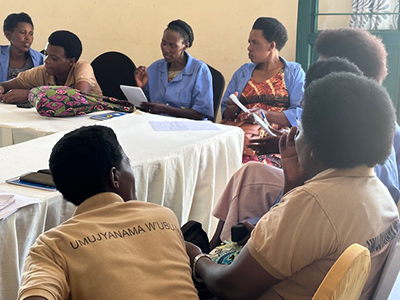Identifying Autism in Rwanda
Thursday, September 21, 2023
The Institute on Community Integration this summer trained community health workers in Rwanda on identifying the signs of autism in children and on principles for addressing the needs of people with disabilities in rural communities. The work was done in July under a College of Education and Human Development Global Signature Grant.
ICI’s Macdonald Metzger partnered with Autisme Rwanda on the four-day session. Community health workers are the first line of contact for many parents with young children with autism and other disabilities, Metzger said. Staff members from Autisme Rwanda also participated in the training.
“The stigma around autism is the same in Rwanda as it is in many African countries where ICI has provided education and training in recent years,” Metzger said. “With any disability, parents are still often hiding their children in their homes because if they were more visible, they would be excluded from their communities. There is still a priority placed on children without disabilities because they are seen as future providers for the family.”
Part of the work included sharing the principles of community-based rehabilitation, a development strategy created by the World Health Organization that involves people with disabilities, their families, organizations, and other community stakeholders in building local resources to provide community services. Participants also learned how to use Autisme Rwanda’s new mobile app as an autism screening tool.
“Here in Rwanda, we have many kids and adults with autism,” said Rosine Duquesne Kamagaju, founder of Autisme Rwanda. “My hope is that news of this training will spread, and that doctors, teachers, and community health workers will ask for help in caring for them so that they have the opportunity to have a job and a future.”
Including the broader picture of disability from a community development perspective helped put the screening tool training into a useful context for participants, said Pacifique Ndishimye, a research scientist who has served the organization as an advisor.
The screening tool also has functionality that will allow health workers to better track numbers of children with autism, an important factor in acquiring more disability resources, Kamagaju said.
Rwanda established a community health worker program in 1995 to help rebuild its healthcare system after the genocide that killed more than 800,000 people, embedding teams of workers in every village that included maternal and child health education and support.
“They are truly the frontline of healthcare here, and this training will help them in identifying and linking individuals with disabilities to healthcare,” Ndishimye said. “It will also help them provide basic disability-related community health education and counseling.”
